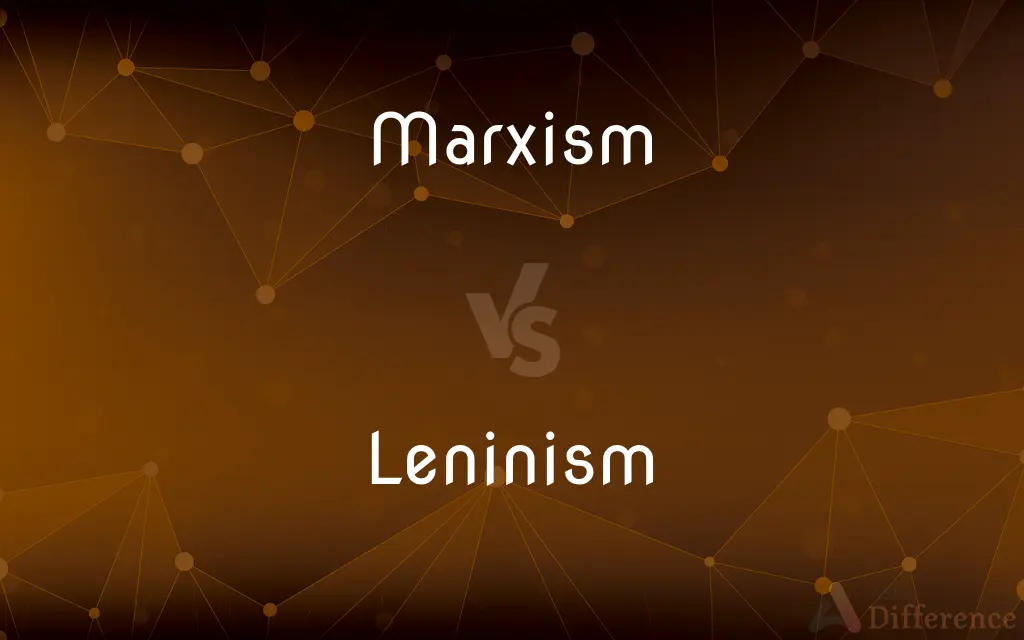Marxism vs. Leninism — What's the Difference?
Edited by Tayyaba Rehman — By Fiza Rafique — Updated on October 1, 2023
Marxism is the socio-political theory developed by Karl Marx and Friedrich Engels, emphasizing class struggle and the means of production. Leninism is Vladimir Lenin's adaptation of Marxism, focusing on imperialism.

Difference Between Marxism and Leninism
Table of Contents
ADVERTISEMENT
Key Differences
Marxism is a political and economic theory originating from Karl Marx and Friedrich Engels, which posits that societies progress through class struggle, particularly between the bourgeoisie (capitalists) and the proletariat (workers). Leninism, on the other hand, is a development and adaptation of Marxist principles by Vladimir Lenin, tailored to the unique conditions and needs of early 20th century Russia.
Marxism emphasizes the inevitable overthrow of capitalist systems by the working class, leading to a classless society where the means of production are owned communally. Leninism, while retaining the core tenets of Marxism, argues for a vanguard party to lead the proletariat and to establish a "dictatorship of the proletariat" as a transitionary stage.
Marxism tends to be more theoretical and analytical, critiquing capitalist structures and envisioning a future socialist state. Leninism is more pragmatic, emphasizing the tactics and strategies required to achieve the goals set out by Marxism in specific national conditions.
Both Marxism and Leninism see the end goal as a communist society. However, while Marxism is a broad theoretical framework applicable to various contexts, Leninism is more specific, emphasizing the role of imperialism in global politics and the necessity of a vanguard party to guide the working class to revolution.
Comparison Chart
Origin
Developed by Karl Marx and Friedrich Engels
Adapted by Vladimir Lenin
ADVERTISEMENT
Core Focus
Class struggle and communal ownership
Vanguard party and dictatorship of the proletariat
Theoretical vs. Practical
Theoretical and analytical
Pragmatic and tactical
End Goal
Communist society through class struggle
Communist society via party-led proletarian revolution
View on Global Politics
Focused on internal class dynamics
Emphasized role of imperialism
Compare with Definitions
Marxism
A worldview centered on the proletariat's overthrow of the bourgeoisie.
Marxism anticipates a future without class distinctions.
Leninism
The belief in a transitional dictatorship of the proletariat.
Under Leninism, a temporary dictatorship safeguards the revolution's goals.
Marxism
A socio-political theory emphasizing class struggle.
Many scholars argue that Marxism provides a critical framework for analyzing capitalist societies.
Leninism
An adaptation of Marxist theory emphasizing a vanguard party's role.
Leninism argues that an elite party should guide the proletariat.
Marxism
A critique of the capitalist mode of production.
Marxism points out the inherent inequalities in capitalist systems.
Leninism
A pragmatic application of Marxist ideals.
While Marxism laid the foundation, Leninism provided a roadmap for its realization.
Marxism
An economic theory where value is determined by labor.
Marxism asserts that a product's value comes from the labor put into it.
Leninism
A Marxist approach tailored to conditions of early 20th century Russia.
Leninism addressed the unique challenges faced by the Russian Revolution.
Marxism
The belief in the communal ownership of means of production.
According to Marxism, the workers should control the factories they work in.
Leninism
A focus on imperialism's role in global politics.
Leninism critiques the global impact of imperialist powers.
Marxism
Marxism is a method of socioeconomic analysis that uses a materialist interpretation of historical development, better known as historical materialism, to understand class relations and social conflict as well as a dialectical perspective to view social transformation. It originates from the works of 19th-century German philosophers Karl Marx and Friedrich Engels.
Leninism
Leninism is a political ideology developed by Russian Marxist revolutionary Vladimir Lenin that proposes the establishment of the dictatorship of the proletariat led by a revolutionary vanguard party, as the political prelude to the establishment of communism. The function of the Leninist vanguard party is to provide the working classes with the political consciousness (education and organisation) and revolutionary leadership necessary to depose capitalism in the Russian Empire (1721–1917).
Marxism
The political and economic philosophy of Karl Marx and Friedrich Engels in which the concept of class struggle plays a central role in understanding society's allegedly inevitable development from bourgeois oppression under capitalism to a socialist and ultimately classless society.
Leninism
The theory and practice of proletarian revolution as developed by Lenin.
Marxism
Alternative case form of Marxism
Leninism
A form of communism based on the writings of Marx and Lenin; called also Marxism-Leninism.
Marxism
A system of economic and political thought, originated by Karl Marx, and elaborated by others. It holds that the state has been the a device for suppression of the masses, allowing exploitation by a dominant (capitalistic) class; that historical change occurs through class struggle; and that the capitalist system will inevitably wither away to be superseded by a classless society.
Leninism
The political and economic theories of Lenin which provided the guiding doctrine of the Soviet Union; the modification of Marxism by Lenin stressed that imperialism is the highest form of capitalism (which shifts the struggle from developed to underdeveloped countries)
Marxism
The economic and political theories of Karl Marx and Friedrich Engels that hold that human actions and institutions are economically determined and that class struggle is needed to create historical change and that capitalism will untimately be superseded by communism
Common Curiosities
How does Leninism relate to Marxism?
Leninism is an adaptation of Marxism, tailored to specific conditions and emphasizing a vanguard party's role.
Who developed Marxism?
Karl Marx and Friedrich Engels.
Does Marxism support a single-party rule like Leninism?
Marxism focuses on class dynamics and doesn't specifically prescribe a single-party rule like Leninism does.
What is Marxism in simple terms?
Marxism is a theory emphasizing class struggle and the communal ownership of production means.
Is Marxism the same as communism?
While both envision a classless society, Marxism is the theoretical framework, and communism is the end goal.
Why did Lenin feel the need to adapt Marxism?
He believed Russia's unique conditions required a tailored approach to achieve Marxist goals.
Who is the main figure behind Leninism?
Vladimir Lenin.
Are all Leninists Marxists?
Yes, Leninism is rooted in Marxist theory, but not all Marxists are Leninists.
Can Marxism be applied universally?
Marxism provides a general framework that can be adapted to various contexts, as seen with Leninism in Russia.
What is the "dictatorship of the proletariat" in Leninism?
It's a transitional state where the working class holds political power to prevent counter-revolutionary actions.
Does Leninism have a different view on imperialism than Marxism?
Leninism places a stronger emphasis on the role and critique of imperialism in global politics.
What's the end goal of both Marxism and Leninism?
A communist society without class distinctions.
How do both theories view capitalism?
Both critique capitalism but Marxism offers a broader analysis, while Leninism focuses on tactical overthrow.
What's a key difference between their approaches to revolution?
Marxism emphasizes a natural overthrow of capitalists by workers, while Leninism promotes a vanguard party-led revolution.
Is Leninism more pragmatic than Marxism?
Yes, Leninism is seen as a more pragmatic and tactical application of Marxist ideals.
Share Your Discovery

Previous Comparison
Glycogen vs. Amylopectin
Next Comparison
Furanose vs. PyranoseAuthor Spotlight
Written by
Fiza RafiqueFiza Rafique is a skilled content writer at AskDifference.com, where she meticulously refines and enhances written pieces. Drawing from her vast editorial expertise, Fiza ensures clarity, accuracy, and precision in every article. Passionate about language, she continually seeks to elevate the quality of content for readers worldwide.
Edited by
Tayyaba RehmanTayyaba Rehman is a distinguished writer, currently serving as a primary contributor to askdifference.com. As a researcher in semantics and etymology, Tayyaba's passion for the complexity of languages and their distinctions has found a perfect home on the platform. Tayyaba delves into the intricacies of language, distinguishing between commonly confused words and phrases, thereby providing clarity for readers worldwide.














































